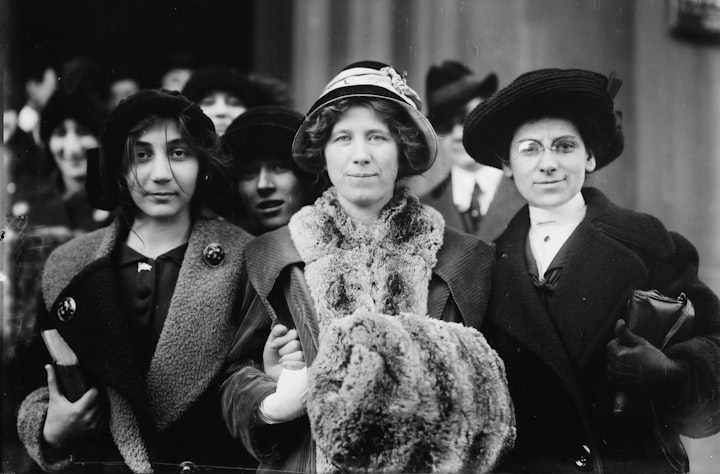100 years of Women's Suffering
1792, a book was written about the concept of basic rights. 1920, women had the right to vote. Let's celebrate women's suffering.

1792, Mary Wollstonecraft publishes Vindication of the Rights of Women.
August 18, 1920, the 19th Amendment granted women the right to vote in the United States.
In nearly 130 years, women were fighting for their basic rights and freedom in modern systems of government. Long before, women in many polytheistic cultures (i.e. Ancient Egypt, Scandinavia, Celtic) had the same rights as men. I am a woman of the 21st century. I have the right to vote, whether I act on it or not is my choice. I also have the right: to own property, have my bank account, choose to keep my maiden name or take my husband, have an abortion, or take contraceptives. I am a woman whose generations after the ones before laid the groundwork to get women like me in the United States of America and many other developed countries, basic rights, and the ability to choose without shame or discrimination.
I appreciate everything that the women before me sacrificed to obtain freedom and choice for their children and grandchildren. If we didn't have these liberties, we would be stuck in a time where a woman is only good for family and home. We couldn't receive a proper education where we as women could obtain college degrees. Women wouldn't be able to hold property or money under their name because their husband is usually the sole proprietor. Some basic exclusions for women to obtain their wages would be if they were midwives or the family was so poor that the wife also has to help out with a decent living wage.
It is the reason why I want to talk today about the importance of chance and giving women the right to do anything they can dream. Even if that means becoming President of the United States one day.
Why women should be granted freedom
Many places throughout the world rank poorly on the gender equality scale. For example, a nation like Japan ranks low on the scale because of the lack of women being placed in higher roles of business or politics. Many Japanese women often leave the workforce once they are married or engaged to become married. Other times, Japanese women continue working while raising a family. While there has been a push to get more women elected into politics or placed in higher roles of offices within the Japanese government or businesses, the effort has been quite slow. Yet here is the rub, Japanese women were given the right to vote 25 years after the United States of America. They may have equal pay or equal rights and choices, but since the declining birth rate in Japan has been rising, many of these rights are being infringed, including the choice to have children. Japan is in the triple digits of gender equality ranking since only 10% of women in Japan have higher-status jobs.
While Japan may be a developed nation, 189 countries around the world are worse off on the gender equality scale than Japan. Many Middle Eastern countries often have very little women in power, unless it has to do with Education, which is considered a more domestic role. In countries such as Africa or India, many women do not complete their education due to menstrual cycles or early marriage. They learn basic literacy to some extent, but they do not go on to continue their education because once you have a period, you're eligible to be married off and have children.
All women in these countries have suffered and earned the right and basic freedom as their male counterparts. For so many countries to believe that educating a woman can cause problems and challenge the status quo, then shame on them for discontinuing the success and liberty that these women have deserved. An educated woman can get a decent job, practice a field that they are passionate about, or can determine how she finds her husband or partner in life. Education opens the doors, women have to merely walk in and decide what they enjoy learning about the most. In Saudi Arabia, long before COVID-19, the prince to the throne has ruled that women should be allowed to learn how to drive a car, or at least obtain the basic rights to learn the functions of an automated vehicle. It was a groundbreaking step into the modern era.
If we hide behind the knowledge that there are more women in the world than men, the great gender imbalance caused by generations of people from the Cultural Revolution in China to Indian economic hardships and infanticide, then we are merely starting on the right foot to ensuring that millions of girls in the future have equal footing.
Why women should have a choice
Margaret Sanger was the sixth child of eleven children that her mother gave birth to. She saw the strain of improper contraceptive use, the wear and tear of children on her mother's health, and the death of her mother at 49 years of age from giving birth 18 times in her lifespan. Margaret's father, Michael Higgins was an Irishman who later after the Civil War fought for women's rights and free public education towards women. It is the principle of free public education, that Margret founded her campaign for public sexual health and contraceptives as well as the importance of discussing sexual and reproductive health with women of working and lower-class society, where the majority of the births were either unplanned or constantly expected.
Sanger went on to attend college and become a nurse. She married William Sanger, an architect. Sanger often suffered from recurring Tuberculosis (TB for short). But she went on to have three sons and the Sanger's resided in New York. Margaret gave up her nursing career after marrying William, as what was customary at the time. When a fire destroyed their home, Margaret went back to her nursing career as a nurse or midwife who went to the homes on New York City's East Side. William took up a professional painting career as well as being an architect. Margaret's overtime became imbued in many socialistic forms of politics and often hung around Upton Sinclair (The Jungle), John Reed, and Mabel Dodge to name a few. It was this nursing career and social politics that Margaret came to create two sex-ed columns in the New York Call. Many people were often outraged and offended at the brisk and radical discussion of sexual education being mentioned. Both columns were later published in a book format in 1916.
But the scenarios that Margaret saw were all too common to come across time and time again. It wasn't just America, but many developed nations all over the world had women die from self-induced or back-alley botched abortions. Without the candor and trailblazing activities of Margaret Sanger, there is a strong possibility that many women would be burdened by their reproductive capabilities and have vast numbers of children. The only prescription that a doctor can prescribe: abstinence, the practice of waiting, or avoiding sexual activity until marriage or to delay childbearing without medicine and common contraceptive practices. Yet this pattern of abstinence is what caused so many children to be born or pregnancies to occur.
While there are several women in developed countries and thousands more all over the world who do not have the way to get proper resources to prevent or delay childbearing, education is vast and available for free on the internet or in the many pamphlets in women's clinics throughout the world. It was Margaret's sexual education campaign that drove me to want to write a blog about sexual education for many women to obtain and read and it didn't include how to practice abstinence. It was going to include menstrual health talks, sexual education talks, and forms of contraceptives or how to use contraceptives for not just women, but men. It takes two to tango. The blog didn't bear any fruit and it was scrapped to help out a local colleague with their project.
But without Margaret or many pioneers like her, there would be no choice for women. We couldn't have a choice between career and marriage duties. We couldn't choose to delay having children if we want to ensure that a marriage is consummated (meaning that the woman is pregnant and a child is on the way). We couldn't choose to pick up our slack in the workforce and ensure that we had some money of our own or a little cash on the side for emergencies.
If we didn't give women a choice to control their bodies and give them the proper information to make the best choice for themselves to achieve success or happiness, then we have shamed women for something that can be considered an option and not a hopeless situation.
Even though it was been a century since women have made their voices heard, there is still a fight that is going on. In the times of the pandemic, the time to act and improve women's choice and freedoms much be of the highest importance. Without women, there will be no leaders, no future children who can ensure that those voices will continue to be heard.
About the Creator
Heather Wilkins
Born in South Carolina, raised in Florida. I enjoy writing for therapy or stress release. Enjoy my ramblings or any updates on cities where I live.






Comments
There are no comments for this story
Be the first to respond and start the conversation.